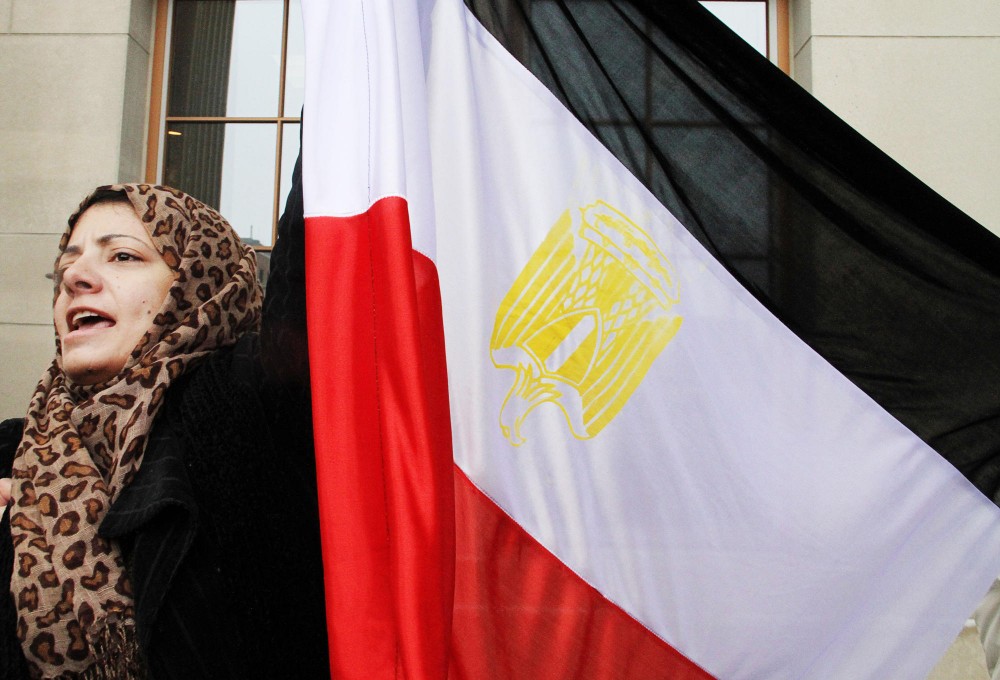Ongoing protests in Egypt reached the University of Minnesota on Friday when students, staff and community members held a demonstration outside of Coffman Union in support of the protestersâÄô desire for a change in government.
Egyptian citizens are protesting the reign of President Hosni Mubarak, who has been in power for 30 years.
“How do you call it a democracy when he has been president for 30 years?” Mona Sonbol, a University student said. “I call it a dictatorship.”
As American television screens broadcast tens of thousands of protesters in the streets of major Egyptian cities, Ragui Assaad is getting more personal, firsthand reports.
Assaad, a professor at the Humphrey School of Public Affairs, has been in near-constant contact with his wife, who lives just outside Cairo, and his mother, who is just minutes from the site of major demonstrations.
After a two-month stay, Assaad left Cairo on Jan. 14, the same night riots forced Tunisian President Zine el-Abidine Ben Ali to flee his country for Saudi Arabia, which sparked a similar uprising in Egypt. Assaad was in Egypt during its recent parliamentary elections âÄìâÄì “Everybody knew they were rigged,” he said âÄìâÄì but did not detect any roiling unrest at the time.
Non-Egyptians join the chorus
On Friday at Coffman nearly 60 people gathered silently on the steps holding Egyptian flags and signs. The silence turned into chants of “Down with the Pharaoh,” “Oppression must stop” and a singing of the Egyptian national anthem.
Not all of the demonstrators were of Egyptian descent but instead showed up to show support of their “Egyptian brothers and sisters.”
University employee Carla Mantel joined demonstrators in support of her friend, who is currently in Egypt. Mantel had heard from her friend Thursday.
Former University student Muhammad Al-Qaisi attended the demonstration to tell protesters there are people “all over the world” supporting them.
“We are with the Egyptian people,” Al-Qaisi said.
Survey finds young, discontent population
Assaad, who was born in Cairo and lived there until he was 18, helped design questions for a recent wide-ranging survey of young Egyptians. The final results of the “Survey of Young People in Egypt,” published in December, shed light on some of the frustrations among Egyptians between the ages of 10 and 29 who make up 40 percent of the countryâÄôs population.
Nearly 16 percent of the surveyâÄôs 15,029 respondents ages 15-29 were unemployed, including 31 percent of young women. The survey also found a detached sense of political engagement.
Only 16 percent of respondents ages 18-29 had ever voted, according to the survey. “Few discuss politics with friends or are even aware of their representatives in parliament.”
Assaad said that previous generations of Egyptians, including his own, had made what he described as an “authoritarian bargain,” in which the government provided jobs and inexpensive food in exchange for near-total control of governing. Assaad said that as more Egyptians attained high levels of education and the government failed to provide new jobs for them, dissatisfaction spread.
“They realize theyâÄôre just as poor as their parents have been,” Assaad said. “And theyâÄôre angry about that.”
Egyptians struggle to find focus
Recent protests in Tunisia are credited with prompting action in Egypt.
William Beeman, professor and chairman of the UniversityâÄôs anthropology department, said the protests in Egypt are different than others that have occurred in the region recently because Egyptian protesters donâÄôt seem to focus on issues like jobs or police.
“Right now the focus is on simply ousting the Mubarak regime, and nobody in Egypt seems to be really paying attention to what is likely to follow,” Beeman said.
But even with the protests, the future of Egypt is uncertain.
Both the religious and secular forces are likely to want a stake in the new government. There is also a chance that nothing may change, as was the case in the 2009 presidential election protests in Iran.
Beeman said without a focus it can be difficult to sustain momentum.
Hopeful about country and kin
When Assaad returned to Egypt in 1982 to supervise projects in waste management, Mubarak had only just taken power from Anwar Sadat, the deeply unpopular president who was assassinated by Islamist militants in the fall of 1981.
“Mubarak was just a gray figure [at the time],” Assaad said. “Nobody knew much about him, I donâÄôt think anybody would have guessed that he would have survived 30 years, either.”
Mubarak has kept Egypt on an official “state of emergency” for nearly 30 years, a label that finally seems proper as instability throws the countryâÄôs future into uncertainty.
For the moment, he said his wife and mother are more concerned about getting by in a moment of chaos. As police retreated over the weekend, in what Assaad saw as a calculated move to prove their worth to Egyptians, bands of looters took to the streets, forcing others to form self-defense groups for their neighborhoods. For days, Egyptians have suffered through a gas shortage, bank closings and a lack of food in markets.
Assaad spoke with his wife Sunday afternoon and said he has not encouraged his Egyptian relatives, which also include his brother, to make plans to leave the country.
“I think they plan to stay,” he said. “IâÄôm optimistic that things will become calmer as the army assumes responsibility for security.”
As for his country itself, Assaad said Egyptians want a new government on all levels but will settle for the presidentâÄôs removal.
“People want the change in the entire regime,” he said, “but I think people will be satisfied if Mubarak leaves, and then they get a sort of transitional regime âÄî towards one that will be more democratically elected.”








